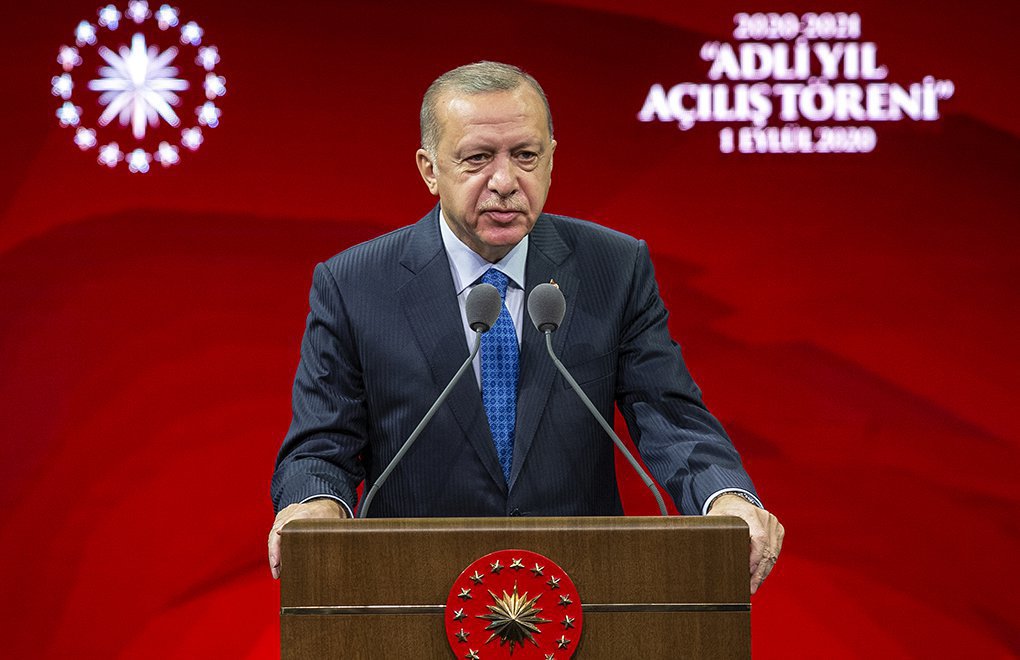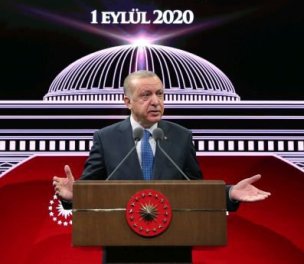* Photo: Ali Balıkçı / Anadolu Agency (AA)
Click to read the article in Turkish
Speaking in the 2020-2021 Legal Year Opening Ceremony at the Presidential Palace yesterday (September 1), President and ruling Justice and Development Party (AKP) Chair Recep Tayyip Erdoğan said that "Turkey made progress in freedom of expression." Noting that they reformed the judiciary with the aim of constructing a reliable and accessible justice system, he said, "We aim to reinforce rights and freedoms."
Referring to the right to criticize and give news as part of freedom of expression, Erdoğan said, "We have ensured that the right to criticize and give news is based on a stronger ground in the legislation." He also expressed his wish that trials would be finalized in a much shorter time.
61 journalists penalized for 'insulting President'
But do his remarks reflect the truth? What do three-monthly BİA Media Monitoring Reports tell us about Erdoğan's statement?
According to the most recent BİA Media Monitoring report covering April-May-June 2020, in the last six years, 61 journalists were given prison sentences, deferred prison sentences or fines for "insulting the President."
Moreover, the Article 299 of the Turkish Penal Code (TCK), which began to be widely used because of publications and thoughts regarding Recep Tayyip Erdoğan after he was elected the President in August 2014, now constitutes the basis for the prison sentences, deferred prison sentences and monetary fines against journalists.
In the April-May-June 2020, six journalists (Mustafa Hoş, Cem Şimşek, Özgür Paksoy, Ahmet Sever, Necla Demir and Erk Acarer) were still on trial for "insulting the President) for their views and criticism about President Erdoğan, facing 28 years in prison in total.
While seven people were convicted of insulting Erdoğan 2019, six people were convicted of this offense only in the second quarter of this year.
In this period, when the effects of the novel coronavirus (COVID-19) pandemic were most severely felt, at least two journalists were arrested and six journalists were detained over their news and articles.
In the year 2019, the European Court of Human Rights (ECtHR) sentenced Turkey to pay 66,024 Euro (410,672 lira) in damages to 14 people, including journalists, who applied to the supreme court claiming that their rights to freedom of expression were violated.
Last year, the Constitutional Court also sentenced the state to pay a total of 191,592 lira for damages to 43 people, including 21 journalists.
In 2019, the Radio and Television Supreme Council (RTÜK) issued 57 monetary fines and 24 program suspension fines to TV channels. Any action was not taken against radio outlets. The council issued a total of 4 million 90 thousand 999 lira of fines to TV channels.
88 journalists stood trial in 3 months
Jointly prepared by Erol Önderoğlu, Sinem Aydınlı and İdil Aydınoğlu, the Second Quarterly BİA Media Monitoring Report also pointed at a period when the Press Advertising Institution (BİK) and the RTÜK imposed harsh penalties on Evrensel, Cumhuriyet and BirGün newspapers on the one hand, and on Fox TV, TELE 1 and Halk TV on the other.
Covering the period when national and international journalism organizations raised their voices for several arrested journalists in Turkey such as Barış Pehlivan, Müyesser Yıldız, Murat Ağırel and Hülya Kılınç on the occasion of May 3 World Press Freedom Day, the report showed that 93 journalists faced 4 aggravated life sentences and 883.5 years in prison as well as non-pecuniary damages of 1 million 260 thousand Turkish Lira (TRY) in total as per the Turkish Penal Code (TCK), Anti-Terror Law (TMK), the National Intelligence Organization (MİT) Law, the Law on Banking Regulation and Supervision Agency (BDDK) and the Law on Capital Market (SPK).
While the previous periods also frequently witnessed the arrest of journalists on charge of "propagandizing for a terrorist organization," this recent period saw rather rare charges such as "political and military espionage" as faced by Odatv Ankara News Director Müyesser Yıldız and "denigrating religious feelings" as faced by journalist Hakan Aygün. While Aygün has recently been released on probation, Müyesser Yıldız is still behind bars.
With the opening of the new legal year yesterday, 28 journalists or rights defenders will have their hearings in September. Among these journalists are also the ones who stand trial on the ground that they disclosed the identity of a Nationalist Intelligence Organization (MİT) member who was killed in Libya, namely Barış Pehlivan, Barış Terkoğlu, Hülya Kılınç, Murat Ağırel, Ferhat Çelik, Aydın Keser and Erk Acarer.
Rights defending is undermined due to laws
While journalists and media outlets are facing more and more pressures over their critical reporting, the new social media law prepared and passed by the ruling AKP and the allying Nationalist Movement Party (MHP) will now pave the way for deletion of access blocked news. The law also foresees fines for the newspapers that do not delete the related content.
Along with the pressures targeting critical journalists and media outlets in Turkey, the attempts to split bar associations and bring social media under a stricter government and judicial control could undermine rights-defending in fields such as freedom of expression even further.
CLICK - The Ends Justify the Means in Purging Critical Media
CLICK - 'Journalist should not question! We arrest! We close down!'
(HA/SD)







